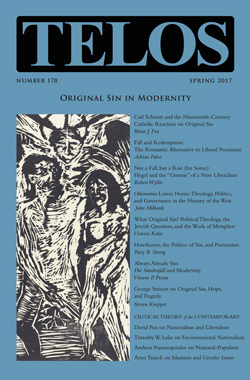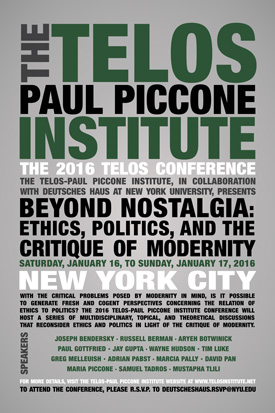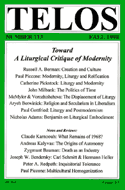Telos 178 (Spring 2017) is now available for purchase in our store.
 “If men were angels, no government would be necessary,” James Madison famously writes in Federalist No. 51. The defectiveness of the human will and the human intellect make government necessary, whether in John Calvin’s Sermon on the Galatians, which Madison echoes, in the locus classicus of this argument, Augustine’s City of God, or in book 9 of Plato’s Laws, which already describes humans’ innate capacity for evil as “a result of crimes long ago.” In modernity, Christian tropes like the Fall and original sin are used not only to justify political power, but also to temper utopian political goals. Reinhold Niebuhr emphasized the latter, for example, when he described the preference of the United States’ purportedly “Calvinist fathers” for relying upon checks and balances rather than the intelligence and goodwill of future American statesmen. Even the most familiar political analyses of original sin and the anthropology of Western Christianity contain this tension between justifying and limiting political power. “If men were angels, no government would be necessary,” James Madison famously writes in Federalist No. 51. The defectiveness of the human will and the human intellect make government necessary, whether in John Calvin’s Sermon on the Galatians, which Madison echoes, in the locus classicus of this argument, Augustine’s City of God, or in book 9 of Plato’s Laws, which already describes humans’ innate capacity for evil as “a result of crimes long ago.” In modernity, Christian tropes like the Fall and original sin are used not only to justify political power, but also to temper utopian political goals. Reinhold Niebuhr emphasized the latter, for example, when he described the preference of the United States’ purportedly “Calvinist fathers” for relying upon checks and balances rather than the intelligence and goodwill of future American statesmen. Even the most familiar political analyses of original sin and the anthropology of Western Christianity contain this tension between justifying and limiting political power.
Continue reading →
By Telos Press · Wednesday, January 11, 2017 Writing at the Claremont Review of Books, Aaron Zack reviews the new English translation of Carl Schmitt’s Land and Sea, now available from Telos Press. Purchase your copy in our online store and save 20% by using the coupon code BOOKS20.
Telos Press’s new edition of Carl Schmitt’s Land und Meer: Eine weltgeschichtliche Betrachtung (Land and Sea: A World-Historical Meditation) provides an essential guide for understanding sea power. . . . Schmitt provides an intriguing analysis of the link between the sea and the modern project’s culmination in creative, free-thinking individuals moving and acting within a liberal, global order . . .
Continue reading →
By Andrew M. Wender · Wednesday, March 30, 2016 Consider the Aristotelian maxim that humankind “is by nature a political animal,” whose capacity for speech, unique “among the animals[,] . . . serves to reveal the advantageous and the harmful, and hence also the just and the unjust.” If one accepts this dictum (and, crucial to this article’s line of thinking, by no means must one necessarily adhere to Aristotle’s rationalist model of “man,” nor any other universalist account of humanness), then the ceaseless question remains: what specific sort(s) of speaking, morally reasoning animal might the human be read as constituting, from within the interpretive mindset of a particular historical and civilizational milieu? Of course, this question presupposes, in a manner that may well be at odds with the anthropological premises of a universalist modern political doctrine like human rights, that, rather than exhibiting a fixed, unitary essence, the human acts as a signifier; as such, this human signifier might potentially refer to myriad worldviews, and sources and assemblages of contextualizing meaning, across which the understanding of humanness can be differently constructed and construed.
Continue reading →
By Lukas Szrot · Monday, February 22, 2016 The following paper was presented at the 2016 Telos Conference, held on January 16–17, 2016, in New York City. For additional details about this and upcoming conferences, please visit the Telos-Paul Piccone Institute website.
 What is modernity? First, a period “occasioned by a peculiarly ahistorical view of the world, which is flattened into an eternal present. The world we experience appears to exhaust all possible worlds.” Second, modernity is deeply rooted in the three Kantian principles of Enlightenment: “‘What can know?’ the question of knowledge; of the ‘What should I do?’ which is the question of ethics, and of the ‘What can I hope?'” What is modernity? First, a period “occasioned by a peculiarly ahistorical view of the world, which is flattened into an eternal present. The world we experience appears to exhaust all possible worlds.” Second, modernity is deeply rooted in the three Kantian principles of Enlightenment: “‘What can know?’ the question of knowledge; of the ‘What should I do?’ which is the question of ethics, and of the ‘What can I hope?'”
The Western modern project is dependent upon both Greek and Hebrew antiquity. In ancient Ionia, Thales of Miletus predicted a solar eclipse, Anaximander predicted the changing of the seasons, Theodorus invented the ruler, the carpenter’s square, and the level, and Hippocrates began accumulating medical knowledge through trial and error. These “pre-Socratic” Ionians were merchants and artisans; they worked with their hands, whereas the Athenians were engaged primarily in contemplation.
Continue reading →
By Lukas Szrot · Tuesday, July 7, 2015 The aftermath of the War on Terror rages on despite bipartisan assurances that “major combat operations are over” and that “the war is coming to a close.” This ongoing conflict has produced, and continues to produce, prodigious human casualties and economic hemorrhaging. Tim Luke’s words regarding September 11, 2001, are in many ways as timely today as they were nearly fourteen years ago.
Continue reading →
By Kyle Nicholas · Monday, June 22, 2015  Catherine Pickstock’s “Liturgy and Modernity,” from Telos 113 (Fall 1998), is an effort to find an alternative to liberal individualism and social fragmentation in modernity. Pickstock finds this alternative in liturgy: a liturgical critique of modernity where “liturgy” functions as a thoroughly political category. Liturgy is specially equipped to confront modernity due to its nature as ritual behavior (and therefore universal among humans). Yet the liturgical is to be favored over “ritual” for two reasons. First, ritual has already been relegated to its own “delimited sphere” in modernity, where it is viewed as a private superstructural category. Furthermore, ritual in the modern mind is regarded merely as “mechanical repetitions divorced from any informing narrative.” Liturgy, on the other hand, responds to the former challenge by its nature as “a pattern of social action” (not a delimited sphere) and responds to the latter by its foundation in a “privileged transcendent signifier.” Catherine Pickstock’s “Liturgy and Modernity,” from Telos 113 (Fall 1998), is an effort to find an alternative to liberal individualism and social fragmentation in modernity. Pickstock finds this alternative in liturgy: a liturgical critique of modernity where “liturgy” functions as a thoroughly political category. Liturgy is specially equipped to confront modernity due to its nature as ritual behavior (and therefore universal among humans). Yet the liturgical is to be favored over “ritual” for two reasons. First, ritual has already been relegated to its own “delimited sphere” in modernity, where it is viewed as a private superstructural category. Furthermore, ritual in the modern mind is regarded merely as “mechanical repetitions divorced from any informing narrative.” Liturgy, on the other hand, responds to the former challenge by its nature as “a pattern of social action” (not a delimited sphere) and responds to the latter by its foundation in a “privileged transcendent signifier.”
Continue reading →
|
|
 “If men were angels, no government would be necessary,” James Madison famously writes in Federalist No. 51. The defectiveness of the human will and the human intellect make government necessary, whether in John Calvin’s Sermon on the Galatians, which Madison echoes, in the locus classicus of this argument, Augustine’s City of God, or in book 9 of Plato’s Laws, which already describes humans’ innate capacity for evil as “a result of crimes long ago.” In modernity, Christian tropes like the Fall and original sin are used not only to justify political power, but also to temper utopian political goals. Reinhold Niebuhr emphasized the latter, for example, when he described the preference of the United States’ purportedly “Calvinist fathers” for relying upon checks and balances rather than the intelligence and goodwill of future American statesmen. Even the most familiar political analyses of original sin and the anthropology of Western Christianity contain this tension between justifying and limiting political power.
“If men were angels, no government would be necessary,” James Madison famously writes in Federalist No. 51. The defectiveness of the human will and the human intellect make government necessary, whether in John Calvin’s Sermon on the Galatians, which Madison echoes, in the locus classicus of this argument, Augustine’s City of God, or in book 9 of Plato’s Laws, which already describes humans’ innate capacity for evil as “a result of crimes long ago.” In modernity, Christian tropes like the Fall and original sin are used not only to justify political power, but also to temper utopian political goals. Reinhold Niebuhr emphasized the latter, for example, when he described the preference of the United States’ purportedly “Calvinist fathers” for relying upon checks and balances rather than the intelligence and goodwill of future American statesmen. Even the most familiar political analyses of original sin and the anthropology of Western Christianity contain this tension between justifying and limiting political power.  What is modernity? First, a period “occasioned by a peculiarly ahistorical view of the world, which is flattened into an eternal present. The world we experience appears to exhaust all possible worlds.” Second, modernity is deeply rooted in the three Kantian principles of Enlightenment: “‘What can know?’ the question of knowledge; of the ‘What should I do?’ which is the question of ethics, and of the ‘What can I hope?'”
What is modernity? First, a period “occasioned by a peculiarly ahistorical view of the world, which is flattened into an eternal present. The world we experience appears to exhaust all possible worlds.” Second, modernity is deeply rooted in the three Kantian principles of Enlightenment: “‘What can know?’ the question of knowledge; of the ‘What should I do?’ which is the question of ethics, and of the ‘What can I hope?'”  Catherine Pickstock’s “Liturgy and Modernity,” from Telos 113 (Fall 1998), is an effort to find an alternative to liberal individualism and social fragmentation in modernity. Pickstock finds this alternative in liturgy: a liturgical critique of modernity where “liturgy” functions as a thoroughly political category. Liturgy is specially equipped to confront modernity due to its nature as ritual behavior (and therefore universal among humans). Yet the liturgical is to be favored over “ritual” for two reasons. First, ritual has already been relegated to its own “delimited sphere” in modernity, where it is viewed as a private superstructural category. Furthermore, ritual in the modern mind is regarded merely as “mechanical repetitions divorced from any informing narrative.” Liturgy, on the other hand, responds to the former challenge by its nature as “a pattern of social action” (not a delimited sphere) and responds to the latter by its foundation in a “privileged transcendent signifier.”
Catherine Pickstock’s “Liturgy and Modernity,” from Telos 113 (Fall 1998), is an effort to find an alternative to liberal individualism and social fragmentation in modernity. Pickstock finds this alternative in liturgy: a liturgical critique of modernity where “liturgy” functions as a thoroughly political category. Liturgy is specially equipped to confront modernity due to its nature as ritual behavior (and therefore universal among humans). Yet the liturgical is to be favored over “ritual” for two reasons. First, ritual has already been relegated to its own “delimited sphere” in modernity, where it is viewed as a private superstructural category. Furthermore, ritual in the modern mind is regarded merely as “mechanical repetitions divorced from any informing narrative.” Liturgy, on the other hand, responds to the former challenge by its nature as “a pattern of social action” (not a delimited sphere) and responds to the latter by its foundation in a “privileged transcendent signifier.” 






